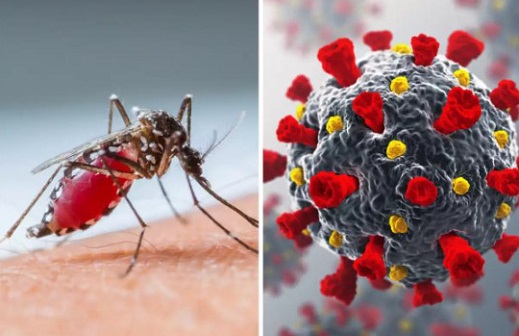Singapore study provides new insights on how prior Dengue infection influences COVID-19 risk and severity
Nikhil Prasad Fact checked by:Thailand Medical News Team Jul 14, 2024 9 months, 1 week, 5 days, 6 hours, 23 minutes ago
Medical News: A recent study conducted by a group of researchers from various prestigious institutions in Singapore has brought to light some fascinating insights about the interplay between dengue fever and COVID-19. This
Medical News report delves into the study’s key findings and explores how a previous dengue infection could potentially impact the risk and severity of subsequent COVID-19 infections.
 Singapore study provides new insights on how prior Dengue infection influences COVID-19 risk and severity
Background: The Study’s Purpose
Singapore study provides new insights on how prior Dengue infection influences COVID-19 risk and severity
Background: The Study’s Purpose
The Singapore study, led by researchers from the National Centre for Infectious Diseases, Yong Loo Lin School of Medicine at the National University of Singapore, Lee Kong Chian School of Medicine at Nanyang Technological University, Saw Swee Hock School of Public Health at the National University of Singapore, the Ministry of Health, the National Environment Agency, the Department of Infectious Diseases at Tan Tock Seng Hospital, and the Duke-NUS Graduate Medical School, aimed to understand whether a prior dengue infection could affect an individual’s risk of contracting COVID-19 and the severity of the disease if contracted.
Methodology: How the Study Was Conducted
The researchers conducted a retrospective cohort study that included all adult Singaporeans aged 18 and above. The study period spanned from July 1, 2021, to October 31, 2022, during which a significant dengue outbreak driven by the DENV3 serotype occurred, followed by waves of SARS-CoV-2 Delta and Omicron variant transmissions.
Using national registries, the researchers classified the participants' infection statuses for both SARS-CoV-2 and dengue. They employed Cox-regression models, which adjusted for various factors like demographics, COVID-19 vaccination status, comorbidities, and socioeconomic status (SES), to assess the risks and severity of COVID-19 following a prior dengue infection.
Key Findings: The Impact of Prior Dengue Infection
The study included a staggering 3,366,399 individuals, contributing to a total of 1,399,696,530 person-days of observation. Here are some of the key findings:
-Increased Risk of COVID-19 Infection: Individuals with a prior dengue infection had a slightly higher risk of contracting COVID-19 compared to those without a dengue history (adjusted hazard ratio, aHR=1.13).
-Elevated Risk of Hospitalization: The risk of COVID-19-related hospitalization was significantly higher for individuals with a previous dengue infection (aHR=3.25).
-Greater Severity of COVID-19: Those who had a prior dengue infection also faced a higher risk of severe COVID-19, which required oxygen supplementation or intensive care unit (ICU) admission (aHR=3.39).
Detailed Analysis: Breaking Down the Data
The study found that the average t
ime between a dengue infection and a subsequent COVID-19 infection was approximately 94.7 days. The researchers noted that the majority of SARS-CoV-2 infections (96.8%) were mild and did not require hospitalization. However, the study’s results indicated that even non-severe dengue infections were associated with increased risks of subsequent COVID-19 infection, hospitalization, and severe outcomes.
Interestingly, the study also observed that the increased risk persisted across different age groups and vaccination statuses. For instance, among individuals aged 30-59 years and those aged 60 and above, prior dengue infection was linked to higher risks of both COVID-19 infection and severe outcomes.
Possible Mechanisms: Why Does This Happen?
The researchers proposed several potential mechanisms to explain these findings. One possibility is the role of antibody-dependent enhancement (ADE), a phenomenon where non-neutralizing antibodies from a previous infection might enhance the severity of a subsequent viral infection. In this case, antibodies from the dengue virus might interact with the SARS-CoV-2 virus in a way that worsens the COVID-19 infection.
Another hypothesis is related to overlapping sociodemographic factors. Individuals at higher risk for dengue might also be more susceptible to severe COVID-19 due to shared environmental or biological factors.
Limitations and Future Directions
While the study provides significant insights, it also has some limitations. The analysis was specific to the period of DENV3 and SARS-CoV-2 Delta/Omicron variant emergence in Singapore, which may not be generalizable to other regions or dengue serotypes. Additionally, the researchers relied on national registry data, which, while comprehensive, may not capture all asymptomatic or mildly symptomatic cases.
Future research could focus on prospective cohort studies to validate these findings and explore the underlying immunological mechanisms in more detail. Such studies could also consider the impact of other dengue serotypes and the potential long-term effects of co-infection.
Conclusion: Implications for Public Health
The study’s findings have important public health implications, particularly for tropical regions where dengue is endemic, and COVID-19 remains a significant concern. Understanding the interplay between these two infections can help in better managing healthcare resources and developing targeted interventions to protect at-risk populations.
The study findings were published in the peer-reviewed journal Open Forum Infectious Diseases (Oxford Journals).
https://academic.oup.com/ofid/advance-article/doi/10.1093/ofid/ofae397/7713034
For the latest on
Dengue or COVID-19, keep on logging to Thailand
Medical News.
Read Also:
https://www.thailandmedical.news/news/previous-or-existing-covid-19-infection-increases-dengue-disease-severity
https://www.thailandmedical.news/news/breaking-dengue-news-study-shows-that-sars-cov-2-antibodies-from-natural-infections-or-vaccines-cross-react-and-enhance-dengue-infection
